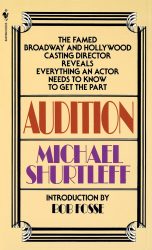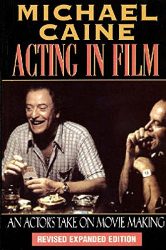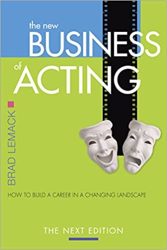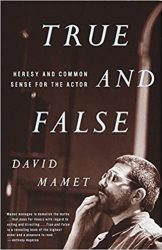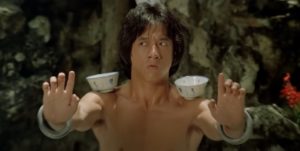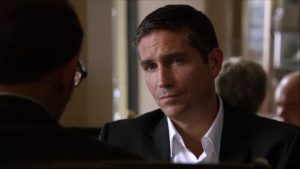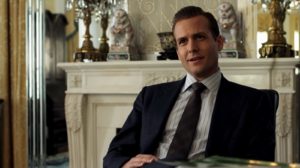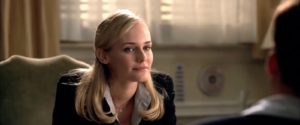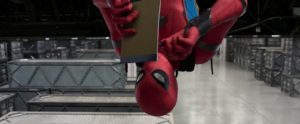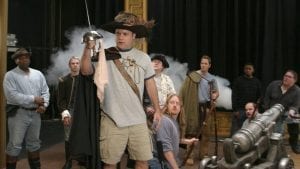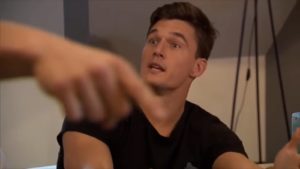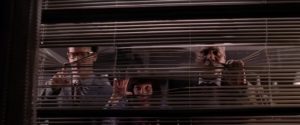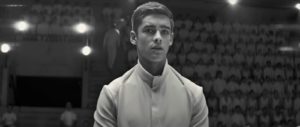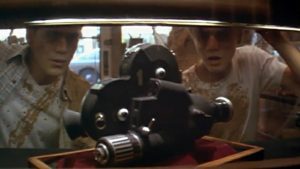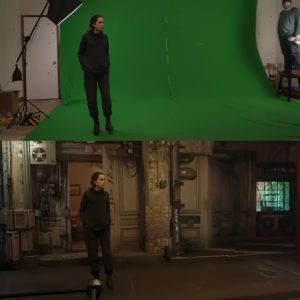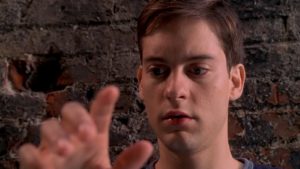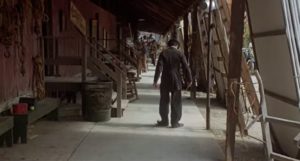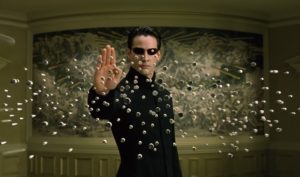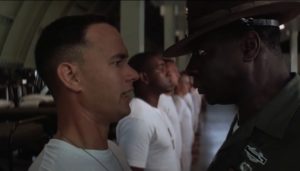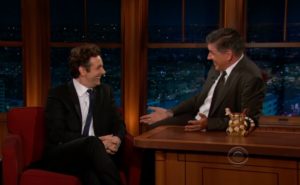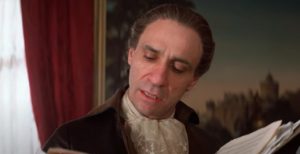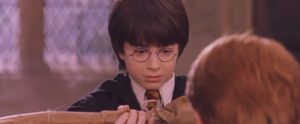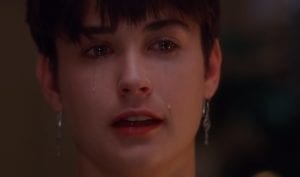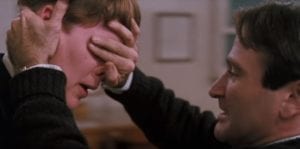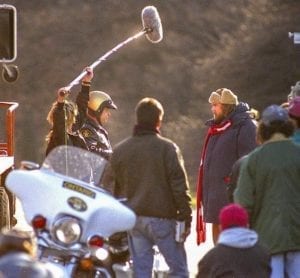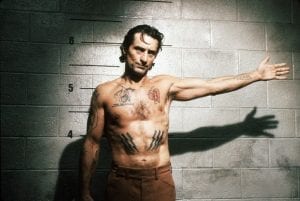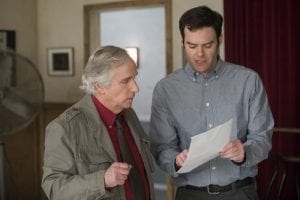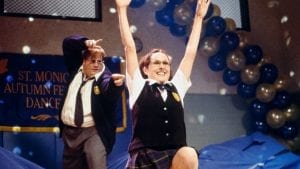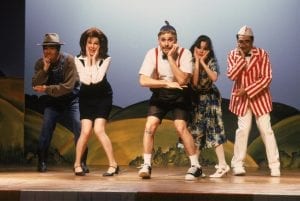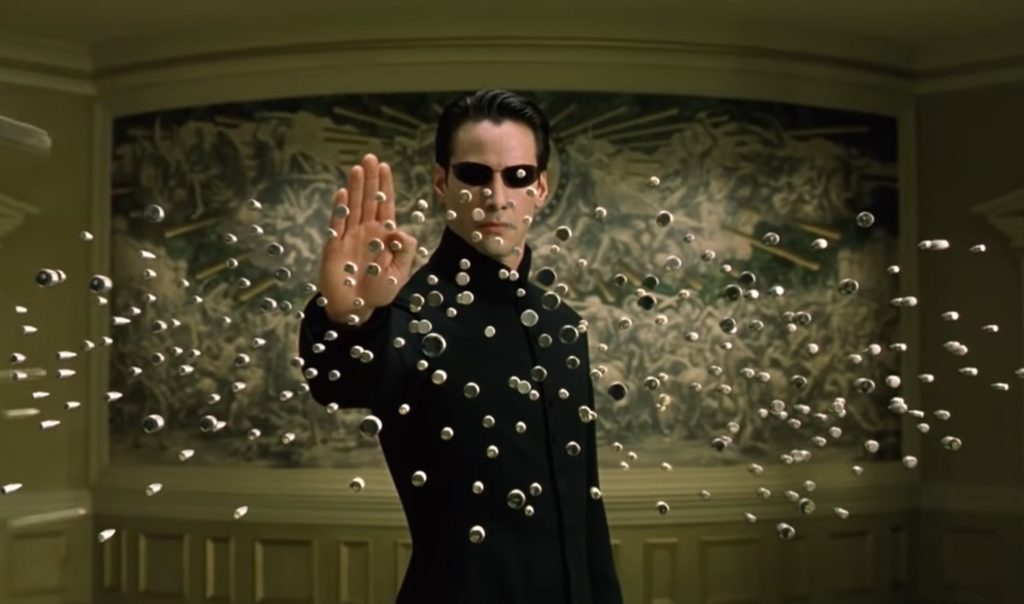
Based on quotes by actors with many credits on IMDb, here are some acting audition tips:
See auditions as opportunities to act, make strong choices and also show that you take redirection well, keep your sides (script) with you to show that your performance is just a rough draft, change your mindset in various ways to not look/feel desperate, and learn to let things go after auditions.
Details, including direct quotes, videos, and commentary, are given below. (By the way, if you enjoy learning about acting from direct quotes by actors, you might also be interested in the article about how actors get in and out of character and the article about what makes a good actor.)
1. You don’t have to be fully off book, just masterful.
There is a divide among actors regarding their thoughts on whether they need to completely memorize their script for an audition. Part of the reason for this division in opinions is that different things are common in different countries, different acting teachers teach different things, and different casting directors have different preferences (e.g. in a previous article, there was an example of audition instructions that said, “Doesn’t need to be perfectly off book.”).
“That’s the way we’re trained to do auditions in Australia—you’re off-book for everything. Here you get to hold the sides and it’s OK and it’s comforting.” – Yvonne Strahovski (source)
Doing research for this article, we found quotes from actors on both sides of the spectrum, but the actors who said you don’t have to be fully off book tended to have somewhat more credits on IMDb, so we decided to explore their opinion a bit more in depth in this article.
You might be wondering, why would anyone not want to have the scene memorized? One of the main reasons for doing so is to show that the audition is not the final performance, to show that the final performance might be something even better. This idea is described by Wallace Shawn and Holly Hunter in the quotes below.
“If I had even the tiniest scrap of advice to give to a young actor who was figuring out how to audition, I would say don’t memorize the script. First of all, most people who try to memorize their script actually get lost and forget things in the new and alarming circumstance of being in the audition. And also, to me it’s a sign of not quite knowing how the game is played, and it’s indicating that this is what your performance would be like, whereas in a way you may be better off if people think you’re just giving a hint of what your performance would be like, and that after weeks of rehearsal you will do something that could never be imagined in the audition.” – Wallace Shawn (source)
“I don’t offer advice to actors only because I’ve seen actors become successful through ways that would never even occur to me or that wouldn’t work for me. But this has worked for me: Never memorizing a scene. I liked to carry the script into an audition, because for me, it reminded people that this was not the final performance.” – Holly Hunter (source)
Not being off-book is counterintuitive, but just because you’re not fully memorized doesn’t mean you don’t prepare. You still prepare very much, because most of the actor’s preparation goes beyond memorizing (for more information about some of this work, see the article about how actors read scripts and the article about what makes a good actor).
It is important to note that the quotes above don’t mean you should not memorize anything. Instead, the quotes mean you shouldn’t memorize the entire thing – there are still parts of the script that should memorize. As Jeff Daniels describes in the video below, it’s important to make sure that you memorize the important parts so that the camera can see your eyes during those important parts. You want to show that you can act, and so much of acting is in the eyes. If they never see your eyes since you are always looking down at your script, then how are they to know that you are a good actor? A preview, even though it’s not a final performance, still needs something the audience can see.
The parts that you don’t memorize, make sure that reading them doesn’t distract you. This means going over the scene over and over so you’re very familiar with the text and, if needed, retyping the text so that it’s large enough for you to easily see, as described by Tovah Feldshuh in the quote below:
“One of the things I do, I retype the text large so I have no struggle to see it with or without glasses; I like to audition without glasses . . . I go at it over and over . . . Then I walk in always, always, always, carrying the scene. You don’t have to be memorized for an audition, just masterful.” – Tovah Feldshuh (source)
What can the result look like? The video below is an example. The video below shows Hugh Laurie’s self-tape audition for House M.D. We can see that he looks down at the script quite often, but that never distracts because he’s clearly very familiar with the text and he has all the important parts memorized. His audition got him the part:
2. See auditions as an opportunity to act.
If you treat auditions as an exam, the resulting nervousness might get in the way of your acting and you might not give your best performance. A lot of audition tips, therefore, are geared towards helping you feel feelings that are more useful than nervousness. Some actors prefer to treat auditions as opportunities to act, because then you can focus on the performance rather than on the thought that it’s going to be evaluated.
“An audition became another opportunity for me to act.” – Bryan Cranston (source)
That away, regardless of the outcome of the audition, you will have already reaped some benefits of the audition: doing something you enjoy doing. Additionally, as Al Pacino’s quote below indicates, auditions are a chance for you to act in front of an audience.
“When I was younger, I would go to auditions to have the opportunity to audition . . . because where are you gonna get an audience? Sometimes the only way you can get an audience is at an audition . . . An audition’s an opportunity to have an audience.” – Al Pacino (source)
As described by Jon Campling in the video below, you can think of the audition space as just another acting space, similar to rehearsal space, stage, or set. Additionally, you can mentally call the audition room “my room”, with the others there simply being people who you’ve invited into your room, to help you feel more comfortable.
3. You can make little requests to feel more power/comfort.
Similar to the idea above that you can prefer to think of the audition space as “your” room, Michael O’Neill suggests that you “own” your audition, and one way to do that is being able to do at least one take the way you want to, before subjecting yourself to redirection. Michael O’Neill describes how he goes about asking for something like that in the video below:
Debra Messing describes a similar idea in the video below, saying that those five minutes you get for the audition are “your time” and you can do with them whatever you wish. As an example, she says that if you find that you’re feeling distracted, such as by thinking of something you had for lunch rather than the scene, you can actually ask to start again.
In the video below, David Harbour describes other types of requests you might make, such as asking the reader to sit down or stand up.
The point is that you’re not making these requests to look confident (even though that may be a side effect). Instead, you’re just genuinely making the situation more comfortable for yourself so you can give a performance you will be pleased with and also, as Hugh Jackman says in the video below, get some more equality in terms of power and create a sense of working together.
In the quote below, William H. Macy describes another way to be collaborative yet powerful: to state your assumptions about the movie or character before you do your audition and going over corrections together.
“I didn’t try to be charming or anything. I said, ‘I think this is a movie about …’ and I said, ‘I think this character is trying to …’ and, ‘I think in this scene, he’s trying to do the following thing.’ … I sort of planted my flag: this is what I’m going to do. And sometimes they’d go, ‘No, it’s not like that.’ But that was a good thing because I’d say, ‘It’s more like this?’” – William H. Macy (source)
4. Be directable.
In an audition, as Andrew Scott describes in the video below, you may be asked to do a second take differently (even if they thought your first performance was brilliant) because they want to see if you can follow direction well, if you would be easy for the director to work with. Therefore, take it as a compliment if they want you to do the take differently (because it means they’re considering working with you) and be ready to do something completely different even if you really like your original idea; if your idea was indeed the best, you’ll still be able to do it if you get the part. For now, they just need to see that you’re directable.
“Try and bring it off the page but don’t get too attached to ideas because they might want you to change what you’re doing.” – Iwan Rheon (source)
In the quote below, Tom Holland describes a method he previously used to really highlight how directable and flexible in his performance he was. Note that he said he “used to” do this trick – he does not do it anymore. Therefore, as with anything, if you try it, don’t overdo it. In the words of Paracelsus, “What is there that is not poison? All things are poison and nothing is without poison. Solely the dose determines that a thing is not a poison.” (source)
“I have this little cheat that I used to do where I would get something really wrong in the first take in the room, so that the casting director would be like, ‘You should try and do it a little bit more like this.’ And then I would do it how I’d actually planned on doing it, and it would show them that I was really good at taking direction. That’s a little trick that I used to do, just to kind of show people that I was malleable and able to work with others.” – Tom Holland (source)
A less extreme version of that is just to make a strong choice and to genuinely be able to change your performance quickly if asked, which is a skill that can be learned through improv, as described by Rosamund Pike in the video below. Improv can teach you to be free in your performance. (We weren’t sure what “Improv” book she refers to in the video but the second book she refers to, True and False by David Mamet, is described in the article about acting books to read first.)
5. Make a strong choice that solves their problem.
The casting director might not know what they want, or they might change their mind when they see something better, so how do you know what strong choice to go with? There are different ways that successful actors have described approaching this task. Consistent with Rosamund Pike’s statement that it’s the actor’s responsibility to bring truth into the character, Patrick Gallagher’s quote below indicates that “truth” is the way to solve the casting director’s problem. That’s one approach.
“There is no right way to do this. It’s only the truth. Make a strong choice and go for it because they don’t know what they want until they see it. I’ve gotten jobs that were written for women. I’ve gotten jobs that were written for older, younger, different races. They’re looking for truth, you know?” – Patrick Gallagher (source)
How do you find “truth”? In the video below, Andrew Scott recommends acting out the lines as yourself, without putting anything on (other than an accent, if necessary) because then you’ll be able to find the character more clearly.
Another approach to create a character and performance that solves the casting director’s problem is to do something that is interesting to watch. An additional benefit of this approach is that you get to feel creative and have fun in the audition, as Chris Geere describes in the quote below:
“Auditions are so much fun. A lot of people dread auditions, they think they have to do it in order to get the job. I don’t really mind if I don’t get the job, as long as I get to do something interesting in the audition. It makes me feel more creative as a person.” – Chris Geere (source)
Yet another approach is to think about what the character wants, as Darby Stanchfield describes in the quote below. She finds that this approach helps you become so focused on what the character wants that it becomes easy to ignore all the irrelevant things that make you feel nervous and desperate. (Other methods to avoid feeling desperate will be described later in this article, in the section about being confident. If you feel that your anxiety and desperation are your biggest difficulties, know that it is something that you can overcome. By the way, you might also be interested in the article about exercises you can use to feel like no one is watching.)
“’You need to care more about what the character wants than anything else.’ You’ve got to care about it more than getting the job, more than whatever director you’re going to meet, who’s in the waiting room, if you’re having a good hair day, what’s on your résumé, what’s in your bank account. You need to care more about what the character wants. If you do the work and prepare the story and you can truly focus that much on telling the story, there’s no room in your mind for desperation or competing in the waiting room or comparing yourself to others.” – Darby Stanchfield (source)
And another approach is to think about what the writer’s intention was, what the character’s purpose in the story might be (one way you can do that is by reading the script as if it’s a novel and empathizing with all the characters, not just your character, to understand the scene as a whole – you can learn more about this method in the article about how actors read scripts). As Lisa Linke describes in the quote below, she began booking a lot more parts after she understood this concept of understanding the writer’s intention. It makes sense. Even if your completely original interpretation of the character is interesting to look at, they still won’t cast you if you just don’t fit in well with the rest of the story. It’s like choosing furniture for a home: it can be super comfortable but, if it doesn’t fit well in the room and looks out of place, people might be reluctant to buy it. Good actors are those who can blend into the story so that the audience focuses on the story rather than on them; therefore, when auditioning, it’s important to show them that you can blend well into their story.
“Once I discovered that what would make me stand out in the audition room was less about my looks, what shirt I wore, and if I “made it mine” by slathering my special sauce all over my performance, and more about if I understood what the writer wrote, I began booking. More importantly, I began booking the room, so I had more opportunities to come back and audition more. My goal was to book the room every time I walked in.” – Lisa Linke (source)
Bryan Cranston gives a nice summary of this whole section in the video below, saying that “an actor is supposed to create a compelling interesting character that serves the text, present it in the environment where you’re auditioning, and then you walk away. And that’s it.”
6. Leave the right impression to get other roles later.
In the previous quote by Lisa Linke, she mentions “booking the room”, which means she won over the casting director regardless of whether she ended up being the person who got the part. Many amazing actors don’t get part for a bunch of reasons they had no control over, such as if they’re meant to play a family member of another cast member and they don’t look like them enough. However, if a casting director sees that this actor is a talented professional (whose audition performances make the casting director look good in front of producers, who might be in the audition room or who might receive audition recordings), they might invite them to audition on other occasions later and, eventually, cast them for something they’re more suited for. As Richard E. Grant says in the video below, it’s like “gold dust” when you have a casting director who believes in you.
Therefore, some actors see auditions as opportunities to “book the room” and get the casting director to remember them as great actors to possibly cast later.
“I always look at auditions as not even getting the job as much as I’m just trying to connect with this casting director so they remember me for next time.” – Sebastian Stan (source)
“When I go to auditions, I don’t think about getting the job. I think about leaving the right impression. I think that every audition is helping to [sow] another seed of people considering me for different things. It’s not necessarily that specific thing.” – Genesis Rodriguez (source)
How do you leave that right impression? Michael O’Neill describes, in the video below, how he learned about how to leave a good impression after he was given a chance to sit on the casting director’s side of the table and see the process of casting from their side. He said that he would see actors bomb auditions by apologizing a lot, because that gave the impression of them not being ready or not wanting the role, and he would also see actors be very professional, just coming in, doing the audition, saying thank you, and leaving quickly. He noticed that it was better to leave quickly and have them ask you to stay rather than you sticking around for too long and them wondering when you’re going to leave. Therefore, one way to leave the right impression could be to just come to the audition, give a great performance, say thank, and promptly leave.
He also learned that 98% of the time, it wasn’t about the actor. It’s about what they needed in the project. Michael Mosley describes that with a soup analogy in the quote below.
“There’s no enemy in the auditioning process. Everybody wants you to be the right person when you walk in the room. We’re all just trying to make a soup here, and they’re trying to figure out the right ingredients for the soup.” – Michael Mosley (source)
When you walk into the auditioning room, the casting director really wants you to be amazing, because then that would solve their problems – they can get the casting over with faster if they find the right person faster. Realizing this can help you feel more confident in the audition room. More methods to feel confident are given in the next section.
7. Be confident – there are many ways to not be desperate.
In the previous section we talked about the importance of leaving the right impression in order to be cast in this part and future parts. A considerable part of the impression you leave is how confident you look, as described in Bryan Cranston’s quote below.
“. . . confidence goes a long way in working as an actor. When you walk into a room for an audition, a big chunk of an actor getting a job is confidence. It’s talent and confidence, and if you can convey both of those things, you’re in great shape.” – Bryan Cranston (source)
It’s easy to just say “don’t be desperate” but how exactly do you do you overcome desperation as an actor in an audition room? There are many ways to overcome desperation and look/feel confident, and we’ll go over some of those ways in this section. Many of them have to do with shifting your mental focus on to something else.
Previously, in Darby Stanchfield’s quote, we saw that really focusing on what your character wants can be one method to shift your focus away from desperation. Similarly, in the video below, Simon Helberg recommends focusing on your reader and on what your character wants from them, without thinking about whether you get the part or not.
One method to look confident, as mentioned by Hamish Linklater in the quote below, is to pretend you also have other people to see that day. This is related to a tip that we will look at later, about how to be have after an audition (some recommend not lingering in the room and instead leaving promptly).
“I put a great deal of effort into making it look effortless—and then pretend I have other people to see later that day.” – Hamish Linklater (source)
Quite a few actors have said that they treat the audition like the first rehearsal, as if they’ve already got the job, as described by Mary Lynn Rajskub in the quote below. That way, you cannot be desperate, because you imagine you already have that thing that you were previously desperate to have. The previously stated tip of treating the audition like an opportunity to act is similar to this tip because, in both cases, the result is that you feel you already have the thing you want. In one case you want to act – and you do have that opportunity – and in the other case you want the part – and you pretend you already have it.
“When you go to auditions, pretend you already have the job and you’re just presenting–almost like you’re at the table read. Don’t go in with an air of, ‘Please hire me.’ You’re like, ‘Here’s my take on it. Take it or leave it. I’ve got a lot of other things to do today.’” – Mary Lynn Rajskub (source)
Other actors still treat the audition as an audition, but they see it as a two-way audition. It’s not just them evaluating you, but it’s also you seeing if you want to work with them, as described by Giovanni Ribisi in the quote below. Many actors act not because of the money but because they enjoy acting; therefore, it can be important to see if the director can provide you with that environment in which you will enjoy what you do.
“It’s not necessarily me auditioning for them. It’s them auditioning for me as well, and really seeing how the rapport will be with the director. The work starts immediately there.” – Giovanni Ribisi (source)
There are also other ways to be confident and not be desperate, and they can depend on why people are desperate to begin with. If actors are struggling to pay rent and come to the audition with that financial stress in mind, that can take away from their performance and their desperation can come through. In that case, perhaps the actor should get an additional job so they don’t entirely depend on acting for their income. In other cases, actors might be desperate because they yearn to feel happy and appreciated. Those things can also be done outside of acting. Having a happy life outside of acting doesn’t mean you’re giving up on acting; in fact, it can help you in your auditions, as Nick Offerman describes in the quote below:
“Make the rest of your life happy. For me, when I started dating Megan, my auditions became so much better, because I knew that when I came home from the audition I got to kiss her. I didn’t give a damn about the audition nearly as much, and that gave me a sense of confidence.” – Nick Offerman (source)
8. After the audition, leave, and let it go.
“After the audition” is a long time – there’s the part when you’re just leaving the audition room, there’s the part that is all the hours and the days and weeks afterwards. Below are some tips from actors regarding both of these stages.
Leaving the audition room
What you do during this stage can affect how the casting director sees you. Multiple actors say that, after the audition, it can be helpful to just say thank you and leave quickly, like a busy professional. In the quote below, Denis O’Hare describes what he does after he finishes an audition and, as is the case with all the other actors quoted in this article, he books a lot of parts.
“. . . I don’t tend to banter—I don’t tend to chat. I don’t try to make friends. I just come in, do my job, and leave. And I also don’t hang around. Once I’m done, I get out of there so fast. I don’t want anybody to see me. I don’t want to have another conversation. I don’t want to have a second audition. I just leave.” – Denis O’Hare (source)
Some might want to stay and chat after an audition but, in the video below, Michael O’Neill describes why that approach is counterproductive: they don’t have time and might get annoyed. It’s better to just leave quickly, and better to have them chase you than try to push you out. Of course, don’t overdo it – just be professional and efficient when you leave the room.
After you've left the audition room
As for your mindset after the audition, knowing that there are many things beyond your control that could affect whether or not you get the part, many actors prefer to just not think about that audition anymore. Personally, I believe that letting go after auditions is one of the most crucial skills for an actor to have because, if you keep dwelling on old auditions, you’ll burn out. To help themselves let go of auditions, some actors like to throw out their sides (script) right after the audition.
“It’s frustrating no matter what, and you have to learn to let it go. That is one thing that I have learned to do no matter if it’s a movie or a show, I throw my papers away and leave the audition there.” – Michael Rosenbaum (source)
Something else actors can do to get their mind off things is to enjoy the rest of their day, such as by doing things they like. As Olivia Holt describes in the quote below, she likes getting yogurt or ice cream with her mom after auditions. Similarly, something I sometimes do is schedule coffee/lunch dates with friends for after the audition, but I don’t tell them I’m coming from an audition. In my mind, that gives me something else to do and, when I finish my audition, I’m already thinking about my upcoming meeting with my friend, which helps me take my mind off my audition.
“After an audition, my mom will usually take me to get yogurt/ice cream and I just go about my day and not think about if I am going to get called back or not.. I just need to leave the audition, with the fact I gave it my all and tried to play the character I believed her to be.” – Olivia Holt (source)
It can also be helpful to remember that there will be plenty more auditions in your career and, even if you messed up, it’s not that big of a deal. Maybe your audition went well and you didn’t realize it, maybe your audition didn’t go so well. Most of the time it was probably fair. However you did in your audition, it is important to be able to let go and think about things that are more useful to think about.
“If I had any advice to give people, it would be to relax; never treat an audition like an emergency. There will be plenty more in your career. If you think you messed up, you probably didn’t. And if you did mess up, it’s not the end of the world. There are more things to worry about in the world than a messed-up audition. It’s out of your hands. So often it’s not down to acting abilities but something an actor has no control over. So go in, be prepared, do your job, and go and enjoy the rest of your day.” – Gregg Sulkin (source)
Is it all actually possible though? To see a real actor describing their mindset before and after an actual audition, you can see the video by Jim Meskimen below (the part after the audition starts at 1:03).
By the way, you want to learn more about how to stop dwelling on thoughts, you can look up what scientific studies about things that reduce “rumination” or “ruminating thoughts” (that’s the psychological term for thoughts that you can’t stop think about). For example, a scientific study (here’s the link to the study) showed that a 90-minute walk in nature can be helpful. A mixture of meditation and aerobic exercise has also been shown to be helpful (here’s the link to the study). If you feel you’re too busy for these things, it might be motivational for you to know that they can help you in your acting as well, because exercise has helped actors memorize lines (you can read more about that in the article about how famous actors memorize lines) and other things you do can act as life experiences you can draw from when you act (you can listen to Alan Rickman talking about that in this link).
9. Everyone is different – you can find your own way.
Similar to the division of opinions regarding having all your lines memorized, there is also a division of opinions regarding whether you need to dress as the character for the audition. Christopher Walken found it not to work for him, as described in the quote below:
“What I used to do was, I’d get the script and see who the character was–a spy, a lumberjack, whatever–then I’d try to dress the part for the audition, to give the impression that I was tough or funny or whatever the part seemed to call for. That was always a disaster. I would never get the job. If I learned anything it’s not to do anything like that. Now if they want to look at me, I go in and let them look at me. Let them figure out their own reasons for why they’d want to hire me.” – Christopher Walken (source)
However, in the quote above, it should be noted that it was likely not just the clothing that changed from beginning to end, but also Christopher Walken’s confidence. Those who might wear costumes might do so out of a sense of desperation, and it might be that desperation and not really the costume that loses them the part. Niecy Nash, as she states in her quote below, has a whole costume closet, and she has plenty of credits on IMDb; therefore, dressing the part can work for some people.
“I don’t usually commit the entire script to memory until after they hire me. I make myself very, very familiar with it, and I look the part. That might mean I have to change hair in the car, clothes in the car. I have a whole costume closet!” – Niecy Nash (source)
Similarly, other things can also work well or not well for different people. Below are some additional quotes with tips that didn’t really fit neatly in the other categories above. Perhaps they can lead you to ideas that work for you.
“They’ll give you four scenes, right? And in each scene, there’s a moment. And they want to see that character do those moments. Pause before you say it. Just pause. Then you throw the punch line.” – William H. Macy (source)
“ Once you get smart about auditioning, you learn to audition before they say ‘Action.’ You walk into the room as the character. You let them think the person you are is close to the character they want. You make them think you already are that guy.” – Chris Pratt (source)
“You have to listen to what they want in the room and pay attention—is the director shy? Does he have trouble making eye contact? Then back off. I want to make him feel comfortable.” – Tovah Feldshuh (source)
There is no one way, and as you can see from Christopher Walken’s quote in the beginning of this section, it’s okay to change your methods as you go. Maybe you might even change others’ methods. Perhaps you might even come up with an idea to improve the way auditions are done.
Whatever you choose to do, be aware that, as a professional actor, auditions are going to be a big part of what you do, so it could be a good idea to make auditions enjoyable.
